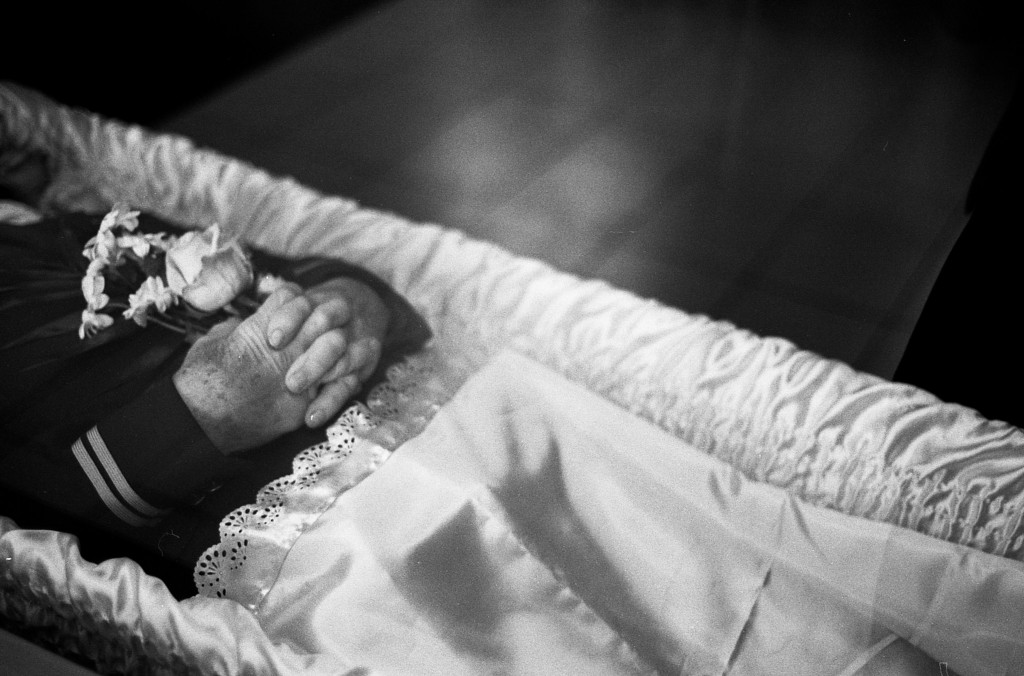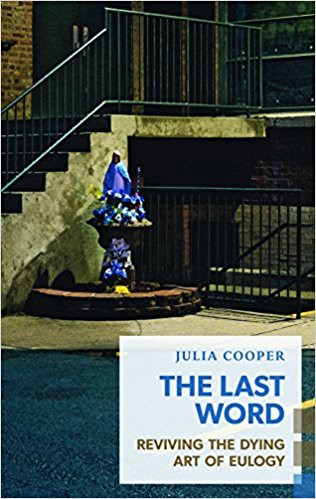We Need More Time To Mourn
Julia Cooper’s ‘The Last Word’

Not too long ago, I was late to a memorial service for a family member because I had to be at work when it started. When I arrived, the deceased’s son was just finishing up his eulogy. There were a few more speeches, the evening prayer, and some food, but I didn’t have much time to reflect on the death. Life kept getting in the way. It was a few more days until the enormity of the loss hit me.
In the era of late capitalism and distraction, it’s hard enough to find time to think. It’s harder still to find time to think about things you’d rather not think about. Death and loss take time to process, but my smartphone and the labor it demands give me easy ways to give that time away. Instead of thinking about the absence of an important person in my life, I allowed the space in my brain to be occupied by the nagging unanswered email, the scandals of the orange man, and the flashes of other undone things that needed to be done.

There are formal ways people reflect on death, like eulogies and obituaries. They’re traditions that give us a structure to sit and write, and therefore think about loss. The Last Word: Reviving the Dying Art of Eulogy by Julia Cooper is a work of cultural and literary criticism that looks at mourning, eulogies, obituaries, and the other ways people talk about death. As Cooper notes, reflecting on death, because it takes time and because it is not an efficient process, is counterintuitive under capitalism. No one gets paid to write eulogies. As Cooper writes, “being absorbed in your grief holds no social value” because we’re not producing or distributing anything of economic worth.

In secular society, grieving is narcissistic. It does no good for the dead — they’re gone. Grieving exists for the living to move on. And while grieving can be a shared, communal activity, it is an ultimately private thing, because the totality of a person cannot be fully comprehended by another person, no matter how much you try to communicate it. Language is useless here.
As a selfish activity, grief has no economic value. But as a shared one, it can be commodified. Mourning a celebrity online is a way to trade appreciative notes about how much Prince’s music or Vilmos Zsigmond’s images affected you, but they’re also a way to stake social capital, to orient you and your tastes in a particular position. You have a duty to instantly tweet out how much David Bowie’s work meant to you, working under that assumption that performing that duty is a form of mourning. But joining the chorus without reflection makes you just one voice among many saying the same thing: that you are sad, and that you have no individual relationship with the dead worth contemplating. The mourning masses are a homogenized voice that shout “I am sad!”
Many of us will know of more dead celebrities than we know of dead people who were personally close to us. Our experience is a world away from those of the people who were actually close to Bowie — a man who was privately dying for a year — and who require personal time to mourn and comprehend an enormous gap in their lives. Leonard Cohen was buried and mourned by his friends and family days before the rest of the world learned of his death. By confusing tweeting and actual, individual grief, we think we have some sort of connection. But mourning a celebrity is one-sided. Not that regular mourning isn’t — you’re not going to get a response from the dead. But with a celebrity, the intimacy of whatever you felt never existed on the other side.
Cooper spends a lot of time writing about the death of Princess Diana. It’s an event that predates Web 2.0 social networks, but Diana, whose funeral was one of the most-watched events in history, represents the commodification and de-individualization of mourning like no one else in history. Upon her death, Diana’s public image was abstracted. She became an idea — a moral fable — rather than a human being. The first official act to commemorate her death was to put her face on a £5 coin.
At Princess Diana’s funeral, Elton John performed an updated version of “Candle in the Wind” that became one of the best-selling singles of all time. The profit went to a memorial for Diana’s death, which hundreds of thousands of people also donated to, not sure what else what to do with grief. “Candle in the Wind” was first written as a tribute to Marilyn Monroe; by repeating it, John turned what could have been a singular expression of grief into something bland and universally applicable. “John treated his Diana tribute single like a rare commodity, but a commodity nonetheless,” Cooper writes.
In the scale of the mourning following Diana’s death, the woman herself was lost, as Cooper says. “There was a tendency in the wake of Diana’s death to search for sites already loaded with meaning and to mourn her there — to layer her death atop other established histories. That is, to grieve her in cliché.” The permanent monuments to Diana are in places that have little to do with the life Diana lived. “No one knew who Diana really was, so they pasted her image onto other recognizable images that already held meaning and cultural value,” as Cooper writes, much in the same way that John treated “Candle in the Wind.”
Public, mass-scale mourning events are older than Diana’s funeral, of course. Cooper traces a line back to Lincoln, also now more myth than man, who was murdered at a time when the nation had sufficient means to communicate quickly over long distances. Lincoln’s coffin took a seven-state tour, traveling by train and stopping in 180 cities before his corpse was buried in Springfield, Illinois, three weeks after his death. At the cadaver’s New York City stop, a military procession took up five blocks on Broadway “while the curbs of sidewalks disappear under the crowds.” Dispatches were wired around the country and pictures were taken with something called a stereoscope. Grieving always kept up with technology.

The labor of mourning is done in private, but grief is still inextricable from one’s public life. Eulogies and obituaries are both written in silence, each form grappling with a person’s life, attempting to render it in prose. Each has its own platform — the eulogy is spoken while the obituary is published in print. The two are also composed by people who have different relationships with the private and public dynamic of mourning. An obituary is a journalistic assessment and does not require any kind of meaningful emotional relationship between the journalist and the dead (an exception is Norman Mailer, who wrote his own obituary, because of course he did). A eulogy, though, is spoken by someone close to the deceased. It is not meant to cover an entire life, and it is addressed to a select few rather than anyone who picks up the paper. It’s a translation of a private expression of grief for a circle of fellow mourners. Giving a eulogy is a group activity.
In this public-private dynamic of mourning, religion plays a central role for most people. But Cooper doesn’t do much to address religion. She isn’t a particularly religious person, and she describes her mother’s turn to Christianity before her death as “a last-minute garment she wore in the final few months of her life — like one might cling to a comforting blanket, devoid of any real healing properties, but still therapeutic.”
Cooper’s discussion of religion in The Last Word is understandably through her relationship with her mother. She doesn’t talk about the rich bodies of writing from theologians on the subject of death. She is more interested in exploring the subject through her individual experience. She writes about an old photograph of her mother playing tennis that reminds her “just how long-ago that instant is now,” and reflects on a grocery list she found in the pocket of a sweater that she keeps because she doesn’t “want to forget what her handwriting looks like” and reminds her of “the constellation of tiny decisions that made up her life.”
But by confining the parameters of that discussion, Cooper neglects the important ways that religion shapes our experience of talking about death and dealing with grief. I’m Jewish, so I can’t speak too much about how Christians mourn their dead. But in Judaism, thousands-year-old traditions like sitting shiva and saying Kaddish form a structure to mourning and remembrance that offers meaning, solace, and acceptance. The religious structure is a sanctuary from late capitalism and its discontents. Because I turn my phone off in shul, and because I recognize a higher power, I have an alternative structure of life to enter that late capitalism cannot easily interrupt, if only for a few hours. Grieving is also a communal experience — to say the Mourner’s Kaddish, or pray during a shiva, one needs a minyan of ten people, which may be comforting but doesn’t allow for the same private wrestling one needs to process a death.
This is not to say that religious structures are, in any way, enough. Cooper isn’t dismissive of religion in particular. She’s skeptical that traditional structures for mourning are adequate at all. She uses the “acculturated rules of funeral decorum” to explain the problems with eulogies. Cooper cites the example of Jacques Derrida who, at the funeral of his friend and fellow philosopher Louis Althusser, apologized for giving a eulogy: “Forgive me, then, for reading, and for reading not what I believe I should say — does anyone ever know what to say at such times? — but just enough to prevent silence from taking over.” (Althusser murdered his wife, so I’m sure the silence was deafening.)
Cooper finds Derrida’s difficulty with eulogizing comforting. If Derrida can’t write a proper eulogy, then maybe, she says, the structure of mourning just isn’t good enough. It’s too neat a format to speak the necessary “ungroomed thoughts” about loss:
“There seems to be words that one ought to say at a funeral — presumably the clichés about heaven gaining another angle, a life fully lived, a candle extinguished too soon, etc. — and that no one (even those who fall into cliché) really has the right words for the occasion of death … It should come as a comfort because it confirms that eulogizing is at its absolute core an amateur’s art.”
One of Cooper’s most admirable qualities is that she refuses to see loss as a rote experience. For her, each death is uniquely devastating. Even while reading Joan Didion’s The Year of Magical Thinking, surely one of the most harrowing chronicles of loss published this century, Cooper diverges from “Didion’s notion that even though grief is disarming, disorienting, and can feel at times fantastical, it is a process that ought to come clear at the end.” To her, Didion’s model of grief is a hoary, Kübler-Ross-like template that seems too efficient. Death is messy; any kind of thinking that makes it seem easy is suspect.
The merits of structured, homogenized methods of dealing with death — like religion — are up for debate. In the least, it’s an individual choice. But whether public or private, mourning is an experience everyone deserves. We live in a time where distractions encroach on our time and bandwidth. Carve out some space for mourning.
Jacob Shamsian is a reporter at INSIDER. He’s also written for Business Insider, GQ, The New Republic, Entertainment Weekly, Time, and Modern Farmer. You can find him on Twitter, where he’s thinking about death.
